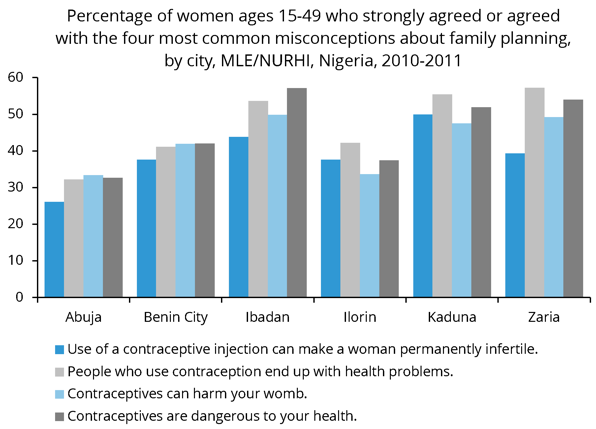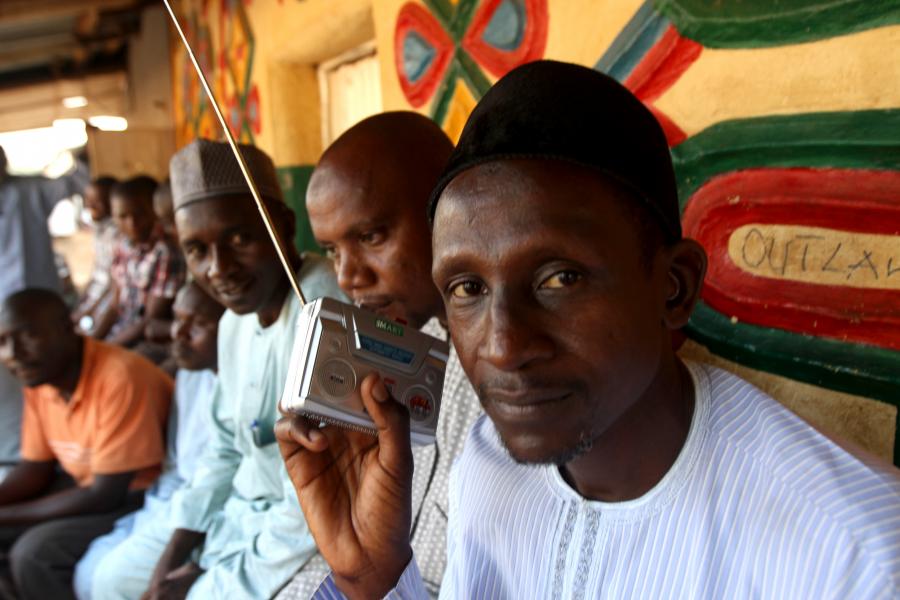Family Planning Use in Nigeria
According to a baseline survey conducted in 2010 and 2011 in the cities of Abuja Federal Capital Territory (FCT), Benin, Ibadan, Ilorin, Kaduna and Zaria by the Nigerian Urban Reproductive Health Initiative (NURHI) and the Measurement, Learning & Evaluation (MLE) Project, among women, radio is an important source of family planning information. More than 57 percent of women with knowledge of family planning at baseline received family planning messages through the radio.

NURHI radio dramas do not specifically address these misconceptions; instead the programs emphasize factual information about family planning.
NURHI baseline data indicated that modern contraceptive use was quite low in urban Nigeria. Reported key barriers to family planning use included resistance to modern contraceptive use by religious and community leaders, low self-efficacy and pervasive myths and misconceptions.
Reaching Out Through Radio Drama, Testimonials and Live Call-in
“Before now I thought family planning was meant for prostitutes. Since I started facilitating and listening to the Second Chance program my mindset has changed. I thank God I got to know about family planning through NURHI. Since my wife and I learned about family planning, there have been no bedroom fights or quarrels….” – Mr. Abdulhakeem Olanrewaju, electrician and radio drama facilitator, Abuja FCT
“Since I became a member of the Second Chance [Abuja FCT] listeners’ group, my orientation about family planning changed. I now see family planning as a way of life, something that is good for the community and the family at large.” – Debbie Igba, event planner and manager, Abuja FCT

Modern contraceptive use rose in all intervention cities between baseline and mid-term, nearly doubling in Kaduna.
Mid-term survey results indicate that the NURHI program overall is heading in the right direction. The targeted urban areas saw contraceptive prevalence rates increase between 2.3 and 15.5 percentage points among women in union from baseline to mid-term – the highest increase was seen in Kaduna from 19.6 percent to 35.1 percent. There was also an increase in intention to use family planning by 7 to 10 percentage points in each city. Results indicate that more than 83 percent of women have been exposed to at least one NURHI activity on the television, radio, in their communities or in their clinics.
The radio program proved to be an important factor influencing these trends. One in four slum residents– which equates to about 4 million listeners–tuned into the first 26 episodes of the radio programs, and data shows that people who listened to the radio program were significantly more likely to use family planning.
“I didn’t know the details about family planning before. I was scared because I have been told that it causes disease and infertility. But from listening to this program, I had a better understanding and the misconceptions corrected. I then went to do IUCD and since then I have had peace with my husband.” – Mrs. Kike Ayeni, petty trader, Ibadan
The radio program also contributed to a decrease in religious and social barriers and helped reduce myths and misconceptions.
- Overall, there was an increase in the percentage of women who approved of religious leaders speaking publicly about family planning from 56.8 percent at baseline to 71.5 percent at mid-term.
- The percentage of women who perceived peer support for family planning rose overall from 22.8 percent at baseline to 42.1 percent at mid-term.
- Generally, there were lower percentages of women in agreement with the myths at mid-term than at baseline, though this continues to be an area of NURHI focus.






